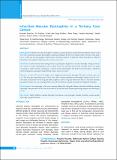Please use this identifier to cite or link to this item:
https://hdl.handle.net/20.500.14356/1218Full metadata record
| DC Field | Value | Language |
|---|---|---|
| dc.contributor.author | Shrestha, Priyanka | - |
| dc.contributor.author | Pradhan, Eli | - |
| dc.contributor.author | Pradhan, Pranil Man Singh | - |
| dc.contributor.author | Thapa, Raba | - |
| dc.contributor.author | Bajimaya, Sanyam | - |
| dc.contributor.author | Sharma, Sanjita | - |
| dc.contributor.author | Duwal, Sushma | - |
| dc.contributor.author | Paudyal, Govinda | - |
| dc.date.accessioned | 2023-05-03T06:21:00Z | - |
| dc.date.available | 2023-05-03T06:21:00Z | - |
| dc.date.issued | 2020 | - |
| dc.identifier.citation | ShresthaP., PradhanE., PradhanP. M. S., ThapaR., BajimayaS., SharmaS., DuwalS., & PaudyalG. (2020). Inherited Macular Dystrophies in a Tertiary Care Centre. Journal of Nepal Health Research Council, 18(1), 88-92. https://doi.org/10.33314/jnhrc.v18i1.2368 | en_US |
| dc.identifier.issn | Print ISSN: 1727-5482; Online ISSN: 1999-6217 | - |
| dc.identifier.uri | http://103.69.126.140:8080/handle/20.500.14356/1218 | - |
| dc.description | Original Article | en_US |
| dc.description.abstract | Abstract Background: Inherited macular dystrophies constitute a group of diseases characterized by bilateral central visual loss with symmetrical macular abnormalities usually presenting in the first two decades of life. The aim of this study were to find out the demographic characteristics and disease pattern of inherited retinal dystrophies in subjects attending retina outpatient department in a tertiary care center. Methods: An observational study among twenty-six participants diagnosed as macular dystrophy visiting a tertiary care centre in Nepal, during January 2018 to June 2018 were included in the study. Detailed history, slit lamp examination, dilated fundus examination, coloured fundus photography, full field electroretinogram, multifocal electroretinogram, automated visual field and colour vision were done. Results: A total of 52 eyes of 26 subjects were diagnosed with macular dystrophy. The male to female ratio was 1:1. The mean age of presentation was 28.38 years. Most common symptom was blurring of vision seen in 96.15%.The mean visual acuity was 0.67 log mar units in right eye and 0.71 log mar units in the left eye. The most common macular dystrophy was cone dystrophy followed by adult vitelliform macular dystrophy and Stargardts dystrophy. Conclusions: Cone dystrophy is the most common followed by Stargardt’s disease and adult vitelliform macular dystrophy. Most presented in the first two decades of life and the most common presenting symptom was blurring of vision. Keywords: Adult vitelliform macular dystrophy; best disease; cone dystrophy; macular dystrophy; occult macular dystrophy; stargardt’s disease | en_US |
| dc.language.iso | en | en_US |
| dc.publisher | Nepal Health Research Council | en_US |
| dc.relation.ispartofseries | JNHRC Print ISSN: 1727-5482; Online ISSN: 1999-6217; | - |
| dc.subject | Adult vitelliform macular dystrophy | en_US |
| dc.subject | Best disease | en_US |
| dc.subject | Cone dystrophy | en_US |
| dc.subject | Macular dystrophy | en_US |
| dc.subject | Occult macular dystrophy | en_US |
| dc.subject | Stargardt’s disease | en_US |
| dc.title | Inherited Macular Dystrophies in a Tertiary Care Centre | en_US |
| dc.type | Journal Article | en_US |
| local.journal.category | Original Article | - |
| Appears in Collections: | Vol. 18 No. 1 (2020): Vol. 18 No. 1 Issue 46 Jan-Mar 2020 | |
Files in This Item:
| File | Description | Size | Format | |
|---|---|---|---|---|
| 2368-Manuscript-14314-1-10-20200420.pdf | 284.48 kB | Adobe PDF |  View/Open |
Items in DSpace are protected by copyright, with all rights reserved, unless otherwise indicated.
